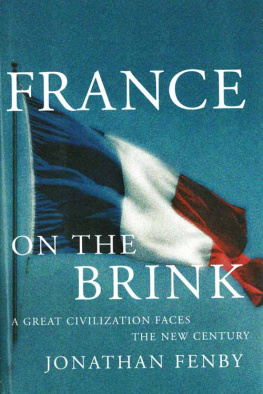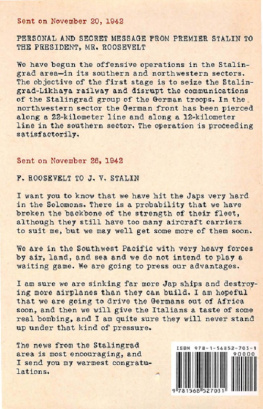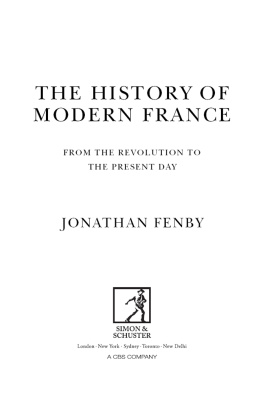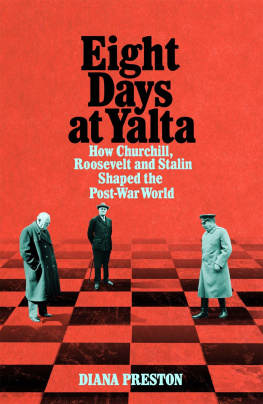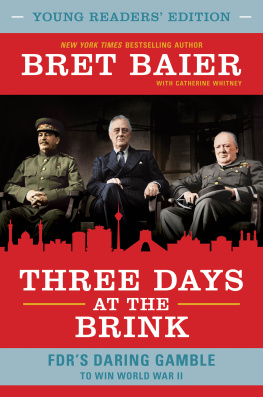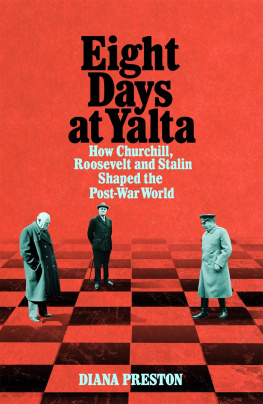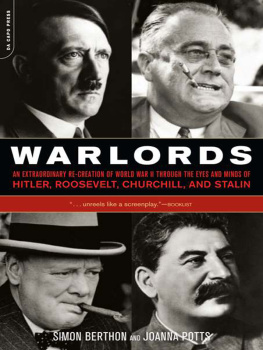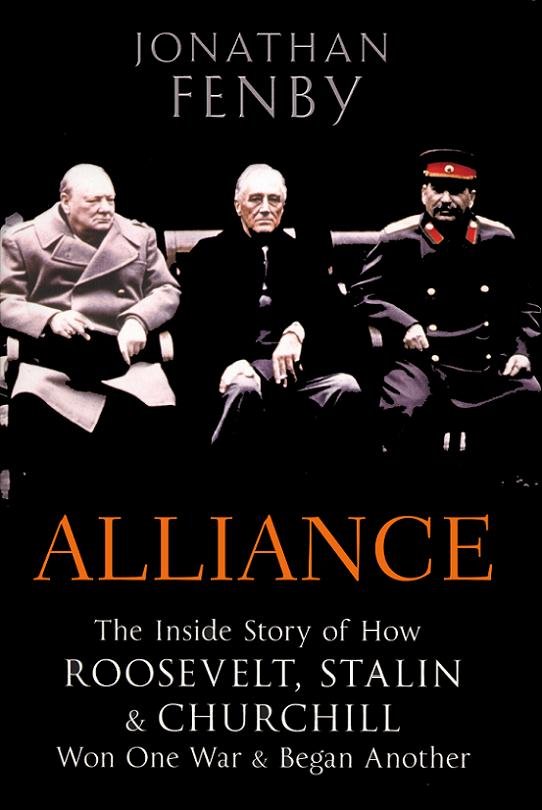Getty Images: 1, 2, 3, 5, 6, 8, 9, 11, 14, 17, 18, 19, 20, 21, 23, 24, 26, 28, 29, 31, 32, 33, 34, 37, 38, 39, 40, 41
Corbis: 7, 12, 25
Popperfoto: 10, 15
Clark Kerr journal, British Archives, Foreign
and Commonwealth Office: 13
Empics: 16
Imperial War Museum: 22
This book is copyright under the Berne Convention.
No reproduction without permission.
All rights reserved.
The right of Jonathan Fenby to be identified as author of this work has been asserted in accordance with sections 77 and 78 of the Copyright, Designs and Patents Act, 1988.
A CIP catalogue record for this book is available from the British Library.
CONTENTS
Prologue
Dinner in Teheran, 29 November 1943
2 The First Summit
Placentia Bay, Newfoundland, 912 August 1941
3 Uncle Joe
Moscow, September 1941
4 World War
Washington, Chequers, Moscow, Chungking, Rome, Berlin, 612 December 1941
5 Four Men Talking
Moscow, Washington, London, 9 December 194114 January 1942
6 Undecided
London, Washington, JanuaryApril 1942
7 The Commissar Calls
Moscow, London, Washington, MayJune 1942
8 Torch Song
Hyde Park, Chungking, Washington, London, JuneJuly 1942
9 Midnight in Moscow
Moscow, August 1942
10 As Time Goes By
North Africa, Moscow, Casablanca, October 1942January 1943
11 Stormy Weather
Washington, Moscow, London, Hyde Park, Quebec, JanuaryAugust 1943
12 Russian Overture
Moscow, October 1943
13 Pyramid
Cairo, 2126 November 1943
14 Over the Rainbow
Teheran, 28November-1 December 1943
15 Ill Wind
Cairo, Tunis, Carthage, Washington, December 1943May 1944
16 Triumph and Tragedy
London, Washington, Normandy, Paris, Warsaw, JuneSeptember 1944
17 The Plan
Washington, Quebec, 1216 September 1944
18 Percentage Points
Moscow, 918 October 1944
19 Red Blues
London, Washington, Moscow, Athens, Paris, Chungking, November 1944January 1945
20 Yalta
Malta, the Crimea, 30 January15 February 1945
21 Death at the Springs
Suez Canal, Washington, London, Warm Springs, 13 February12 April 1945
22 Journeys End
Potsdam, 17 July2 August 1945
ACKNOWLEDGEMENTS
The idea for this book came out of a lunchtime conversation at an Italian restaurant with Andrew Gordon and Christopher Sinclair-Stevenson. So my first thanks must be to them for that, and for nurturing the project in the following couple of years.
Among those who helped along the way I would like particularly to thank Andr Villeneuve who was a constant source of support, ideas and material, and who came up with many useful comments after reading the draft manuscript. He and Lisa were, once again, hospitable hosts during the writing, as were Annie Besnier, Peter Graham, Sarah and Andrew Burns, Brian Oatley and the Harthill group, including the style guru. Jim and Susan Verna showed generosity out of measure in New York while I was researching in American archives, as did Anne and David Cripps.
Luba Vinogradova came up with Soviet material. Warren Kimball offered advice from his great fund of knowledge at the start of the project, and David Carlton and Odd Arne Westad contributed most useful pointers. Allen Packwood guided me at the Churchill Archive in Cambridge, and provided Foreign Office documents. Rob Hale gave medical insights. I am extremely grateful to Robert Harvey for providing me with invaluable source material and for his stimulating observations. Michael Barratt Brown came up with an unknown story of Churchill as a penicillin guinea-pig.
As always, I am greatly indebted to the staffs of libraries and archives consulted, notably those at the Roosevelt Library in Hyde Park for the papers of both the President and Harry Hopkins, the Oral History Archives at the Truman Library and Columbia University, and, in Britain, the Public Record Office, the British Library, the London Library, the Imperial War Museum, the Foreign Office, the Churchill Archives in Cambridge and the Cabinet Rooms and Churchill Museum in London. The voluminous documents in the Foreign Relations of the United States (FRUS) collection were an invaluable source. I have also made much use of memoirs, diaries and other papers of participants in the wartime alliance, as recorded in the notes; as with previous books, I am only grateful that so many people kept such full, and often frank, private records.
Edwina Barstow was an excellent and cheerfully patient editor, Martin Bryant applied his eagle-eye to the copy, and Sue Gard polished the proofs. Sara Arguden was as helpful as ever, and Alexander urged me on from the other side of the world. My greatest debt, as always, is to Rene, whose support, editing, comments and patience make her the perfect partner in every way.
PROLOGUE
Dinner in Teheran
29 NOVEMBER 1943
The only thing worse than allies is not having allies.
WINSTON CHURCHILL
IT WAS JOSEF STALIN who sparked the row. Throughout the lavish dinner the Soviet leader had been needling Winston Churchill. His tone was heavily jocular, his sniping relentless. Marshal Stalin lost no opportunity to get in a dig at Mr Churchill, the official American account recorded. Almost every remark that he addressed to the Prime Minister contained some sharp edge.
The Prime Minister refused to be provoked even when Stalin referred to the long-standing British reservation about launching a frontal attack on Nazi forces in France as suggesting a secret affection for Germany -perhaps he even wanted to offer the enemy a soft peace. Just because the Russians were simple people, the dictator said, it was a mistake to believe they were blind.
As the waiters brought hors doeuvres, borsch, fish, meat, salads, and fruit, wine, Russian champagne, vodka and brandy, Franklin Roosevelt said little, sitting in his wheelchair and confining himself to commonplaces and clichs. Later, he told his Cabinet he found Stalins teasing of Churchill very amusing. His interpreter, Charles Bohlen, on the other hand, described the atmosphere as acrid.


